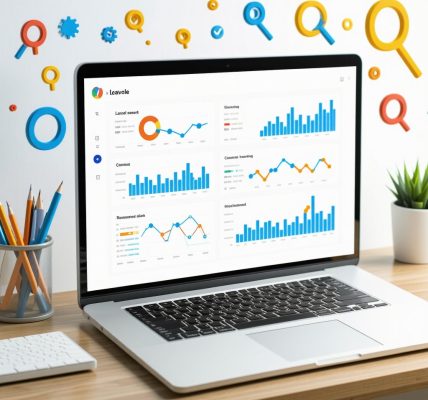Unlocking the Power of Keyword Planner to Elevate Your Google Business Profile
In the competitive world of local search, simply having a Google Business Profile (GBP) is not enough to stand out. Leveraging Google’s Keyword Planner can transform your profile into a magnet for local customers by aligning your business listing with the exact terms your target audience is searching for. This article dives deep into expert strategies that harness Keyword Planner insights to optimize your GBP, ensuring your business not only appears in relevant searches but also outranks competitors in your area.
Crafting a Magnetic Business Description with Strategic Keywords
The business description is a crucial real estate on your GBP that Google uses to understand your offerings. Utilizing Keyword Planner, you can identify high-intent and locally relevant keywords that resonate with your ideal customers. For example, a local bakery might discover popular search phrases like “artisan sourdough near me” or “gluten-free pastries in [city].” Incorporating these naturally into your description ensures your profile speaks the language of your customers while enhancing visibility.
Remember, keyword integration should feel organic to maintain readability and trustworthiness, avoiding keyword stuffing which can diminish user experience and SEO effectiveness.
Enhancing Service & Product Listings through Data-Driven Keyword Insights
Keyword Planner doesn’t just help with descriptions; it’s invaluable for optimizing your service or product sections. Identify niche services or popular product variants your customers frequently search for, then tailor your listing titles and details accordingly. This precision targeting can elevate your relevance in local searches, making your profile a preferred choice.
For instance, if you run a landscaping business and find “eco-friendly lawn care” is trending, highlighting that service explicitly can capture a segment of environmentally conscious clients.
How Can I Use Keyword Planner to Continually Refine My Google Business Profile?
Continuous optimization is key to maintaining and improving your GBP’s performance. Keyword trends evolve, and Keyword Planner offers dynamic insights into search volume fluctuations and emerging phrases. Regularly revisiting your keyword strategy allows you to update your profile with fresh, relevant terms—whether it’s adjusting to seasonal demands or capitalizing on new local search trends.
Additionally, pairing Keyword Planner data with Google’s own insights in the GBP dashboard can provide a comprehensive understanding of how users find and interact with your listing.
Amplifying Local SEO with Expert Keyword Targeting and Optimization Techniques
Integrating Keyword Planner insights into your GBP is a foundational step, but combining this with broader local SEO tactics exponentially boosts your visibility. Consider exploring advanced Google Business keyword strategies to dominate local search results and secure your spot in the coveted local 3-pack.
Furthermore, managing citations, garnering positive reviews, and updating your profile regularly complement keyword optimization to create a robust local SEO ecosystem.
For authoritative guidance on keyword research best practices, the official Google Ads Keyword Planner Help Center offers detailed insights directly from the source.
Have you experimented with Keyword Planner in your GBP optimization? Share your experiences or questions below to join the conversation and learn from fellow local SEO enthusiasts!
Integrating Seasonal Trends and Event-Based Keywords for Timely GBP Optimization
One advanced tactic for harnessing Google Keyword Planner is to align your Google Business Profile with seasonal trends and local events. Keyword Planner enables you to detect spikes in search volume correlated with holidays, weather changes, or community happenings. For example, a garden center might notice increased searches for “spring planting services” or “fall mulch delivery” during particular months. Embedding these temporal keywords into your GBP description and service listings not only captures timely demand but also signals to Google that your business is relevant and current.
Additionally, local events such as festivals or conferences can create unique keyword opportunities. By incorporating event-specific keywords like “[City] music festival catering” or “conference shuttle services near me,” businesses can attract visitors searching for related services during these peak periods. This dynamic keyword alignment goes beyond static optimization, fostering enhanced engagement and conversions.
Leveraging Competitor Analysis with Keyword Planner for Strategic Advantage
Google Keyword Planner also offers a window into your competitors’ keyword strategies. By inputting your competitors’ business categories or URLs, you can uncover which keywords they rank for or target heavily. This intelligence allows you to identify gaps or underserved niches in your local market. For instance, if competitors are focusing on broad terms like “plumbing services,” you might capitalize on more specific keywords such as “emergency leak repair in [city]” to attract high-intent customers.
Moreover, combining competitor keyword insights with your unique value propositions can shape a differentiated GBP that stands out. This approach aligns with proven GMB ranking techniques that emphasize relevance and specificity to outperform competitors in local search results.
How Can Businesses Balance Keyword Optimization with Authentic Customer Engagement on GBP?
While keyword optimization is critical, it must harmonize with genuine customer interaction to build trust and credibility. Google increasingly prioritizes user experience signals such as review quality, response time, and engagement in local ranking algorithms. Hence, the challenge lies in integrating keywords naturally within responses, posts, and updates without compromising authenticity.
One practical method is to use Keyword Planner to inform but not dictate your communication. For example, if “family-friendly restaurants in [city]” is a valuable keyword, ensure your replies and posts reflect this theme by highlighting family-oriented amenities and experiences sincerely. This balanced approach nurtures customer relationships while reinforcing SEO signals.
Experts suggest regularly analyzing interaction metrics via the GBP dashboard alongside keyword performance to fine-tune this balance. For more insights on managing customer reviews effectively, check out our guide on GMB review generation best practices.
Incorporating Long-Tail Keywords to Capture Hyperlocal and Niche Traffic
Long-tail keywords, characterized by their specificity and lower competition, are a goldmine for GBP optimization. Google Keyword Planner helps identify these highly targeted phrases that match precise local intent, such as “24-hour emergency locksmith in downtown [city]” or “organic pet food store near [neighborhood].”
By integrating such long-tail keywords into your business description, services, FAQs, and posts, you can attract highly qualified leads who are more likely to convert. This strategy complements broader keyword targeting by filling niche gaps and enhancing your profile’s overall semantic relevance.
Moreover, long-tail keywords often reflect voice search queries, increasingly important as mobile and smart assistant usage grows. Optimizing for these queries aligns your GBP with evolving search behaviors, sustaining competitive advantage.
For a comprehensive approach to local SEO and Google Business Profile optimization, consider exploring our guide on comprehensive local SEO optimization techniques to elevate your local presence strategically.
Harnessing Local Link Building to Elevate Your Google Business Profile Authority
While keyword optimization is essential, amplifying your Google Business Profile’s authority through strategic local link building can dramatically enhance your local search rankings. Local backlinks from reputable community organizations, industry-relevant directories, and local news outlets signal to Google that your business is an integral part of the local ecosystem.
Focus on cultivating relationships with complementary local businesses and sponsoring community events to organically earn backlinks. For example, a local gym could partner with a health food store to cross-promote events and share links, reinforcing relevance and trustworthiness in Google’s eyes.
Moreover, leveraging tools like Moz’s Local SEO guide on link building provides actionable tactics to identify and acquire high-value local links that directly impact your GBP visibility.
Implementing Advanced Schema Markup: Beyond Basics for Enhanced Local SEO Signals
Schema markup remains an underutilized yet powerful tool to communicate directly with search engines about your business. While basic LocalBusiness schema is standard, integrating advanced structured data such as Service, Product, Event, and Review schema can differentiate your profile in local search results.
For instance, incorporating Event schema for upcoming local promotions or workshops can enable rich snippets that boost click-through rates. Similarly, embedding Review schema helps surface star ratings and review counts prominently, enhancing perceived credibility.
Utilize Google’s official documentation on LocalBusiness structured data to implement comprehensive markup that aligns with your GBP content for maximum SEO benefit.
What Are the Best Practices for Maintaining Schema Accuracy Amidst Frequent GBP Updates?
Maintaining schema markup accuracy is critical as your Google Business Profile evolves with new services, products, and events. Experts recommend integrating schema management into your content update workflow to ensure consistency.
Automated tools and CMS plugins can assist in dynamically generating schema based on your latest GBP data, reducing manual errors. Furthermore, regular validation using Google’s Structured Data Testing Tool or Rich Results Test helps identify and rectify issues before they impact your search presence.
Aligning your schema strategy with your keyword insights from Google Keyword Planner ensures your structured data reflects the most relevant and current search intents, harmonizing technical SEO with content relevance.
By deepening your expertise in local link building and schema markup, you position your Google Business Profile to not only rank higher but also deliver enriched user experiences that convert.
Strategic Integration of User Intent and Semantic SEO in GBP Optimization
Elevating your Google Business Profile beyond rudimentary keyword placement necessitates a nuanced understanding of user intent and semantic SEO. By leveraging Google Keyword Planner, businesses can discern not only high-volume keywords but also the contextual relevance that drives meaningful engagement. This entails analyzing search queries’ underlying intent—whether informational, transactional, or navigational—and tailoring your GBP content accordingly to resonate authentically with prospective customers.
Moreover, incorporating semantically related terms and synonyms enriches your profile’s topical authority, enabling Google to better comprehend your offerings holistically. Such semantic layering reduces reliance on exact-match keywords, fostering a natural yet optimized narrative that appeals both to algorithms and human readers.
Harnessing Geo-Modifiers and Hyperlocal Keywords to Outrank Competitors
Geo-modifiers—specific location indicators within keywords—play a pivotal role in hyperlocal SEO strategies. Google Keyword Planner can reveal granular search data pertaining to neighborhoods, districts, or landmarks that your target audience frequently references. Embedding these hyperlocal keywords within your GBP elements like services, posts, and FAQs not only sharpens your local relevance but also mitigates competition from broader city-wide searches.
For instance, a dental clinic in the “Old Town” area might emphasize “Old Town cosmetic dentistry” over generic terms, capturing intent-driven traffic with higher conversion probabilities. This precision targeting aligns with insights from Moz’s Local Keyword Research Guide, which highlights the efficacy of hyperlocal keyword deployment in driving qualified leads.
How Can Advanced Data Segmentation in Google Keyword Planner Improve Local Market Penetration?
Advanced users of Google Keyword Planner exploit data segmentation features to dissect keyword performance by device, location, and time. This granular analysis enables businesses to identify peak search periods, preferred platforms, and micro-locations where demand surges, facilitating tailored marketing initiatives.
For example, a restaurant could discover elevated mobile searches for “late-night delivery” during weekends in a specific suburb, prompting targeted offers and profile updates to capture this niche demand. Such data-driven adjustments optimize resource allocation and maximize ROI by aligning GBP content with real-time market dynamics.
Elevate Your Profile: Engage with Cutting-Edge Local SEO Insights Today
Mastering the interplay between keyword research and local SEO tactics is indispensable for sustaining competitive advantage in Google’s evolving landscape. By integrating user intent analysis, geo-modifiers, and advanced data segmentation into your Google Business Profile strategy, you unlock pathways to heightened visibility and customer engagement.
We invite you to delve deeper into these advanced methodologies and transform your local search presence. Engage with our expert community to exchange insights and propel your Google Business Profile to unparalleled heights.
Frequently Asked Questions (FAQ)
What is the primary benefit of using Google Keyword Planner for my Google Business Profile?
Google Keyword Planner provides detailed insights into the search terms your local customers use, enabling you to optimize your profile with high-intent, relevant keywords. This targeted optimization enhances your profile’s visibility in local search results, attracting qualified leads and improving your chances of appearing in the local 3-pack.
How often should I update my Google Business Profile keywords based on Keyword Planner data?
Keyword trends are dynamic, changing with seasons, events, and market shifts. Regularly reviewing Keyword Planner data—ideally quarterly or in response to notable local events—ensures your profile stays aligned with current search behavior, maintaining optimal relevance and competitive edge.
Can I rely solely on Keyword Planner data for optimizing my GBP?
While Keyword Planner is invaluable for keyword research, it should be integrated with other local SEO tactics such as managing citations, acquiring reviews, and updating content regularly. Additionally, combining Keyword Planner insights with Google Business Profile’s own analytics provides a holistic optimization strategy.
How do long-tail keywords improve my Google Business Profile’s performance?
Long-tail keywords are more specific, often reflecting detailed user intent and lower competition. Incorporating these into your profile captures niche, hyperlocal searches, attracting highly qualified visitors who are more likely to convert, thus improving both visibility and engagement.
What role does competitor keyword analysis play in enhancing my GBP?
Analyzing competitors’ keywords through Keyword Planner reveals gaps and opportunities in your local market. By identifying underserved niches or highly targeted phrases competitors overlook, you can tailor your profile to fill these voids, differentiating your offering and gaining strategic advantages.
How can I balance keyword optimization with authentic customer engagement on GBP?
Integrate keywords naturally within genuine customer interactions such as responses to reviews and posts. Focus on providing helpful, sincere information that reflects your brand values, ensuring SEO benefits do not compromise user trust and experience.
What advanced techniques can I use beyond basic keyword placement to enhance my GBP?
Advanced tactics include leveraging schema markup for rich snippets, incorporating semantic SEO by using related terms, utilizing geo-modifiers for hyperlocal targeting, and employing data segmentation from Keyword Planner to tailor content by device, location, and time for maximum impact.
How important are seasonal and event-based keywords for my local SEO strategy?
Incorporating seasonal and event-driven keywords aligns your profile with timely local demand, capturing spikes in interest around holidays or community events. This timely relevance signals to Google your business’s current activity, boosting engagement and conversions during peak periods.
What are best practices for maintaining schema markup accuracy with frequent GBP changes?
Integrate schema updates into your content workflow, use automated tools or CMS plugins to dynamically generate schema, and regularly validate your markup with Google’s Structured Data Testing and Rich Results tools. Keeping schema accurate ensures enhanced search features and avoids SEO penalties.
Can local link building impact my Google Business Profile’s rankings?
Yes, acquiring local backlinks from reputable community organizations, directories, and local media enhances your profile’s authority and trustworthiness in Google’s eyes, contributing to improved local search rankings and increased referral traffic.
Trusted External Sources
- Google Ads Keyword Planner Help Center – The authoritative source for understanding Keyword Planner functionalities, offering detailed guidance on keyword research best practices and data interpretation directly from Google.
- Moz Local Keyword Research Guide – Provides expert insights into hyperlocal keyword strategies, geo-modifiers, and competitor analysis, invaluable for refining local SEO tactics aligned with Keyword Planner data.
- Moz Local SEO Guide on Link Building – Offers actionable strategies for acquiring high-quality local backlinks, crucial for boosting Google Business Profile authority and search rankings.
- Google Developers: LocalBusiness Structured Data – Comprehensive documentation on implementing advanced schema markup to enhance local SEO signals and enrich search result appearances.
- Google Search Console Structured Data Testing Tool – Essential for validating and troubleshooting structured data, ensuring schema accuracy and improved search visibility.
Conclusion
Optimizing your Google Business Profile with Google Keyword Planner is a multifaceted process that extends beyond simple keyword insertion. Harnessing keyword insights to align with user intent, incorporating long-tail and geo-modified terms, and dynamically adjusting for seasonal and event-driven trends collectively elevate your local search presence. Complementing keyword strategies with authentic customer engagement, local link building, and advanced schema markup creates a robust SEO ecosystem that drives sustained visibility and conversions.
By embracing these expert techniques, your Google Business Profile becomes not just a static listing but a dynamic, authoritative local brand beacon. We encourage you to apply these insights, share your optimization experiences, and explore further expert content to continually refine your approach and dominate your local market.




I found the section on continuously refining your Google Business Profile using Keyword Planner especially insightful. In my own experience managing a local café’s profile, regularly updating keywords to reflect seasonal trends, like “pumpkin spice latte near me” in the fall, has noticeably boosted both online visibility and foot traffic. However, balancing keyword integration with authentic communication can be tricky—overloading descriptions with too many phrases can feel impersonal and might turn potential customers off. I’ve tried to align keywords naturally within genuine responses to reviews and posts, which seems to foster trust while still supporting SEO goals. I’m curious how others approach updating their GBP with evolving keyword trends without diminishing the genuine feel of their customer engagement? Do you rely more on automation tools or manual updates? Any tips on maintaining that balance effectively would be appreciated!